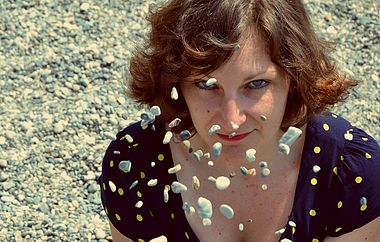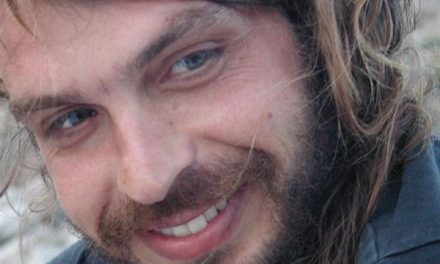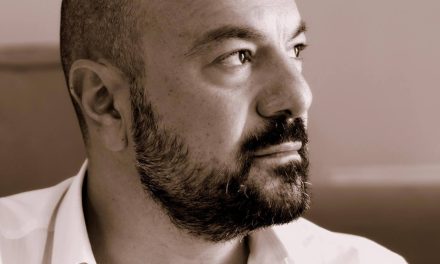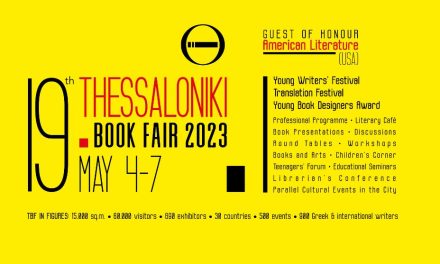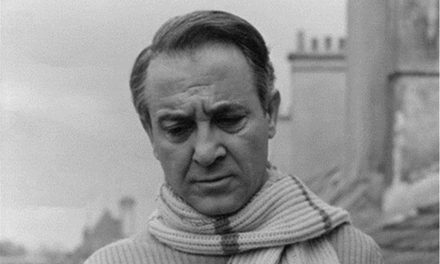Andriana Minou is a musician and writer, born in Greece and living in London since 2004. She works mainly as a pianist and is the founder of the Vladimir&Estragon Piano Duo and the Oiseaux Bizarres Ensemble. As an academic researcher she has organised the 1st International Jani Christou Conference (London, 2013) and has presented her work at IRCAM, Centre Pompidou (Paris, 2014). She has written librettos and performance texts for operas and performances presented around Europe (Amsterdam, Berlin, Athens etc.). As a composer/songwriter she has released albums with the DIY label FYTINI (as Delicassetten Machimenai and andrianette) and composed music for various performances.
She writes poetry and fiction in Greek and English and her work has been published by Strange Days Books, poetix, Entefktirio, Mandragoras, codepoetry (Greece), Story Brewhouse (U.S.A.), The Paper Nautilus, rattle journal (U.K.) and more. Her latest projects include a set of poems set into music by a jazz quintet and the script for a photo-romance novel. This summer, it was the second year in a row that she co-organised Sand Festival, the first literature festival at the remote island of Gavdos in Greece.
Andriana Minou spoke to Reading Greece* about her first short stories collection Underage Noirs and her multidisciplinary artistic ventures, her way of “using language as an instrument to approach physicality, often ignoring grammar, syntax and punctuation in order to highlight its musical qualities” and how “she plays with words because she is attracted by their sounds while she plays with sounds because she is enchanted by the stories they give birth to in her mind”.
She also comments on artistic production in Greece at present noting that “artistic institutions, publishers etc. tend to underestimate audiences in Greece and end up sacrificing quality over commercial success although (at least a part of) the Greek audience has proven to be able to appreciate quality” and that “mutual support and true love for art might be the keys for managing to be creative in spite of the difficult situation in Greece”.
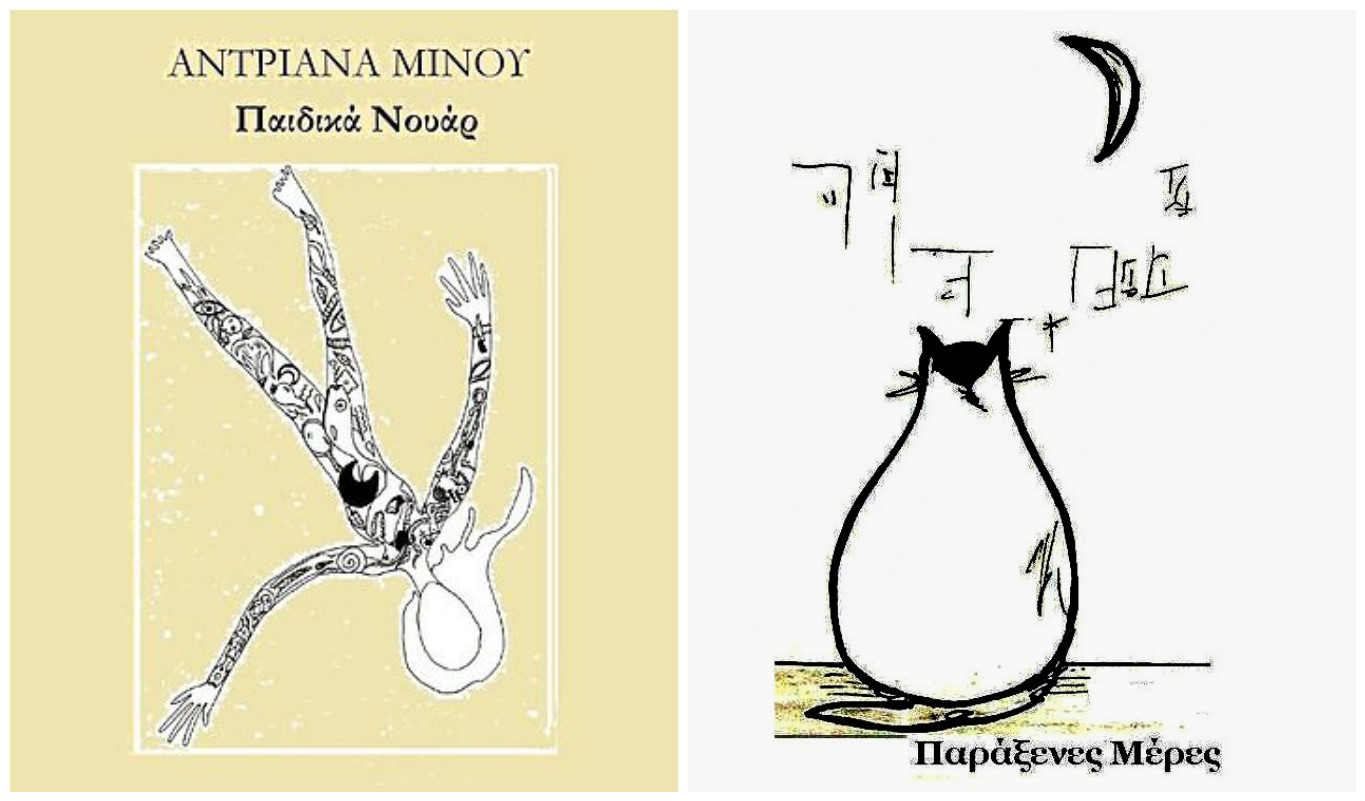
Your first book, Underage Noirs, has received rave reviews. Tell us a few things about the book and your decision to trust your first writing attempt to Strange Days Books, a small publishing house in Rethymno, Crete.
Underage Noirs is a collection of 13 short stories that could be read separately but could also be regarded as a single work of literary fiction, as the conceptual thread running through them is quite distinct. Almost all Underage Noirs tell the stories of couples and deal with the need of individuals to re-invent themselves within the frame of relating with their objects of desire; this process can be comical or tragic or (usually) tragicomic. A man who cannot blink, a strange machine which decodes your unspeakable thoughts, a constipated Muse, Cary Grant, Ingrid Bergman, Icarus, Ariadne, Persephone, an eccentric biologist; it’s all a game, for which everyone seems to be underage, including the author as well as the reader. Characters from Greek mythology as well as from classic film noirs co-exist in a variety of disguises throughout the book. The stories are drawing from the themes of complex emotion versus sentimentality, the craving and terror of togetherness, otherness as something adorable, the mysterious mental state of enamoured subjects, shuffling the archetypal/mythical roles of lovers, and more. The evergreen clichés of romantic love affairs (especially their manifestations in classic film noirs) are deconstructed and reconstructed in unexpected ways.
It was pure luck that I bumped into Strange Days Books. Until then, my work had been published in anthologies and journals in Greece and abroad, however I had no clue how the publishing world actually worked. Strange Days Books was the very first publisher I ever sent my book to and I think I was extremely lucky to follow my instinct and collaborate with them. They are perhaps the only publisher in Greece that doesn’t ask writers to contribute to publication costs and their integrity in every respect is almost Don Quixote-like. I sent my book to them because I was impressed by their manifesto and I was happy to discover that every single word of it was true and that they publish books exclusively out of genuine love for good literature. I feel proud to have been accepted in their “family”, grateful for their immense support and thrilled to see them manage to publish beautiful books in Greece against all odds.
“I usually take reality and transform it or turn it upside down”. How is it that you write without using commas and full stops? What is your driving force?
Ι love using language as an instrument to approach physicality, often ignoring grammar, syntax and punctuation in order to highlight its musical qualities. The way I write is usually almost violent, I fall into a sort of dream-like state, it’s a bit like having a lucid dream, where you seem to be able to control the characters and situations that surround you but at times you realise that it was the dream that had control over you after all.
This summer, it was the second year in a row that you co-organised Sand Festival, the first literature festival at the remote island of Gavdos in Greece. How would you characterize literary and, more generally, artistic production in Greece at present?
I think artistic production in Greece is a bit of a schizophrenic case, although I feel like this is more or less the situation globally. On the one hand you’ve got artists with great networking skills, who seem to have “occupied” big venues, the media, everything but many of them don’t seem to have much or anything new to say on an artistic level. On the other hand, especially since the financial crisis has officially commenced in Greece, I keep hearing about, meeting and watching extremely talented Greek artists who struggle to promote their work and I am always very happy when I see that some of them manage to make their work known.
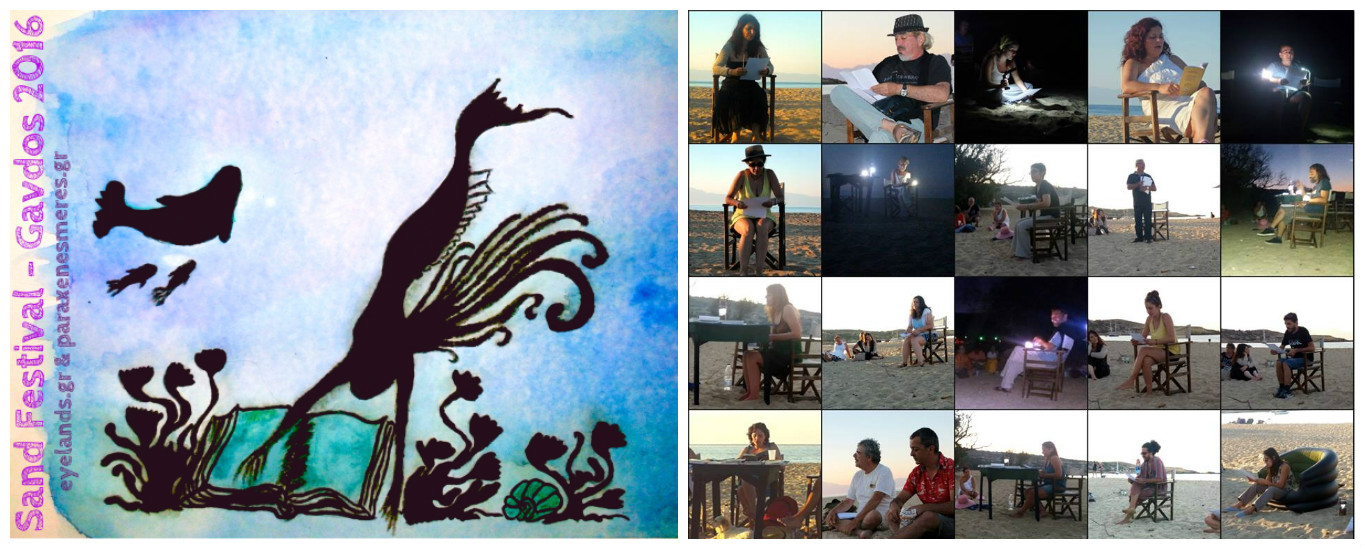
In other words, the feeling I get is that artistic institutions, publishers etc. are mainly interested in making a profit out of art but fortunately independent artists somehow manage to reach (at least a part of) the audience. And I think there is a paradox here, because, for instance a big publisher would be very reluctant to publish a young writer’s first book, no matter how good it was, as it would probably not sell, especially if it’s not mainstream. However, I have seen examples of great books by new writers that were published by independent publishers and they did sell after all. One would expect a successful publisher to take more financial risks than a poor, independent publisher, especially because they have a greater capacity to promote their books. But this doesn’t seem to be the case in Greece and unfortunately, I can’t help but think that artistic institutions, publishers etc. tend to underestimate audiences in Greece and end up sacrificing quality over commercial success although (at least a part of) the Greek audience has proven to be able to appreciate quality.
Now, Sand Festival in Gavdos is an example of what independent artists can achieve without means of promotion or financial support; it was a crazy idea by Strange Days Books and eyelands.gr, of course and I just helped a little with organising. This year we had more than 20 writers and poets coming from every corner of Greece simply to share their work and the unselfish support we received from websites such as artplay.gr and allaboutfestivals.gr was truly touching. Most of our supporters were complete strangers to us, who found out about the festival and just wanted to help and all the participants had no financial benefit from the festival whatsoever; I think the highlight of the festival was the theatre company, ProTasi, who came all the way to the southernmost point of Europe to perform a wonderful play for us out of pure solidarity. The case of Sand Festival proves that mutual support and true love for art might be the keys for managing to be creative in spite of the difficult situation in Greece.
As an academic researcher you have organized the 1st International Jani Christou Conference (London, 2013). What made you decide to focus on this renowned Greek composer?
I came to know Jani Christou’s music when I was still studying in Thessaloniki, through one of my piano teachers, Nelli Semitekolo, who used to be a close friend and collaborator of his. I was fascinated by his music and, most importantly, by the fact that he didn’t seem to have any inhibitions about expanding the traditional limits of music through the use of any sort of artistic material in order to express himself in the most effective way. I also felt great admiration for his educational background, as he had studied with Wittgenstein, Russell and Jung, intellectuals that informed his artistic work and whom I deeply admired. I think Christou was a unique case in the global music scene, and I decided to focus on him because I believe that his work should be studied and performed more everywhere, as it reaches beyond the limits of contemporary music performance, offering a precious, mystical experience to musicians and audiences. To be honest, I am not interested in the form of academia that merely produces academic papers and deals with things that are relevant only for a limited avant-garde of intellectuals. Challenging norms has always come as something natural to me and I think doing research on Jani Christou’s groundbreaking works was the best choice I could have made in the music field from this aspect.
“The paradox in my case is that I play with words because I am attracted by their sounds while I play with sounds because I’ m enchanted by the stories they give birth to in my mind”. How is writing combined with music?
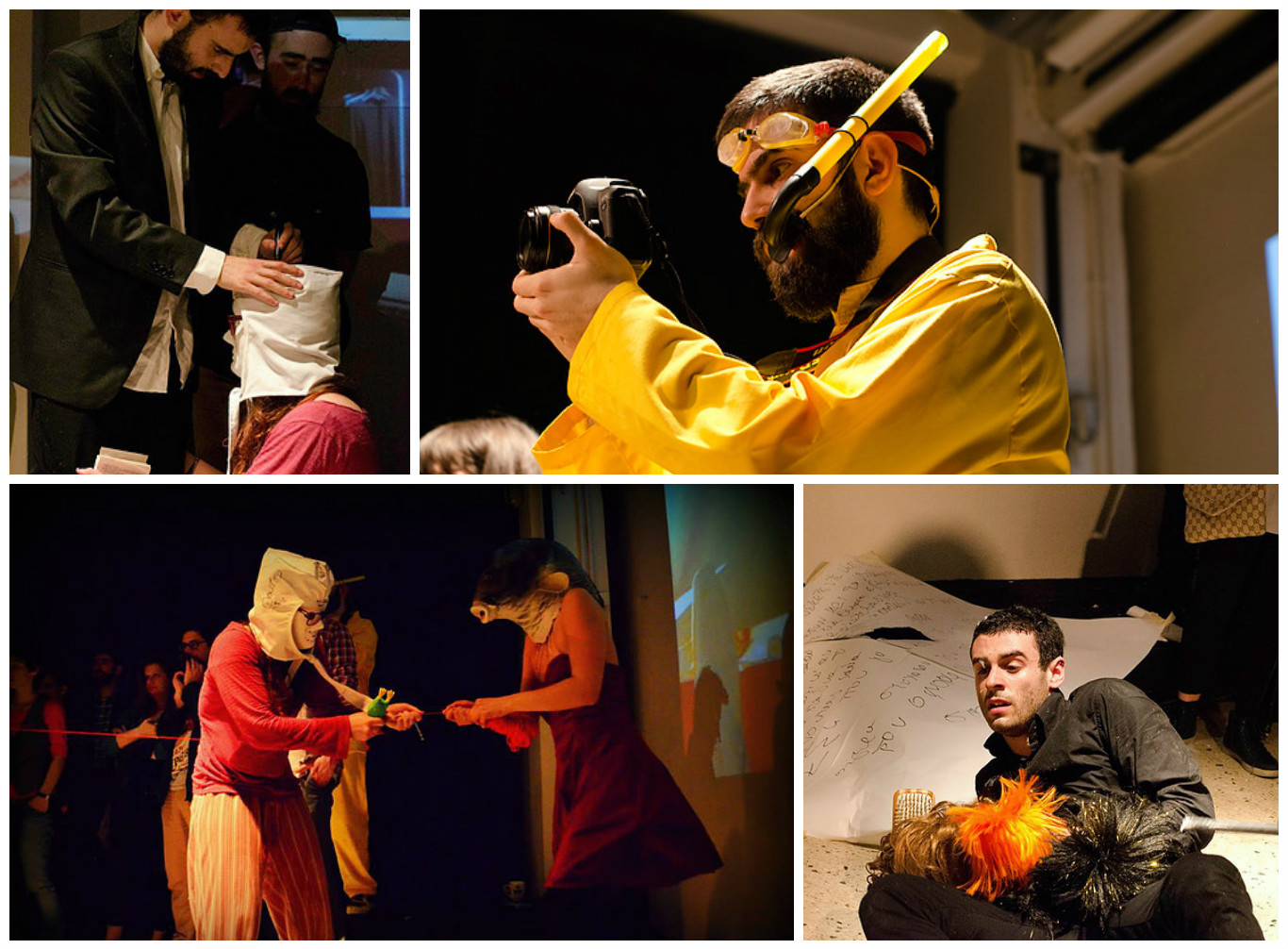
Maybe I suffer from a strange form of synaesthesia but the phrase you mentioned above is quite literal. It might have to do with the fact that I started both writing and playing music at a very young age so perhaps that’s why my artistic processes as a musician and as a writer are intertwined. I literally find stories behind sounds and I also love exploring the purely musical quality of words in order to extend their meanings. I experience life as music and literature and you can’t chop life in little pieces or put it in little boxes; what I see around me is a mass of situations, characters, actions, events that connect to each other in innumerable ways and I can’t help but put this sensation into my writing.
Your music and performances have been presented in venues around the world. How easy was for a Greek artist to make ends meet in London? Tell us a few things about your multi-disciplinary artistic ventures.
I came to London in 2004 to study at first, after having a difficult year trying to work as a musician in Greece. I found work quite easily as a piano teacher and pianist when I was still doing my PhD, in various schools so I could say I solved my financial problem and I got to meet people that were happy to help me professionally quite easily here. I never experienced racism or prejudice in London, and this is what I enjoy most in this city; the fact that people behave as professionals at work and the fact that you very rarely feel like a foreigner.
Regarding my artistic ventures, I usually prefer to work with my network of artist friends, whom I admire and with whom I share a common artistic code. This is how the Oiseaux Bizarres ensemble was born, for example; its core consists of a group of very special artists around Europe with whom I was fortunate to study in the University of Macedonia. With the Oiseaux Bizarres we have travelled to England, Ireland and Greece to present works mainly by Jani Christou and composer Thanasis Deligiannis, with whom I collaborate quite often as a musician and/or writer in projects we usually present in Amsterdam.
Generally speaking, I work on many projects at the same time, and I like them to be as different to each other as possible. For example, at the moment one of my songs has just been released in an album by label FYTINI about the amazing Dadaist Baroness Elsa von Freytag Loringhoven, some of my poems are being performed around Europe in the form of songs by the Kaja Draksler Octet and I just finished composing music for Evi Minou’s (that’s my sister) new film, but at the same time I am working on the libretto for an opera by Theofilos Lambrianidis, the music for a theatre performance by Anastasia Koumidou, some short stories that I aspire to put together in a new book as well as a staged adaptation of Underage Noirs that I am hoping to present in Thessaloniki next year in collaboration with director Sophia Karakantza and Grigoris Papadogiannis from Strange Days Books.
As you can see, I love getting involved with as many different art forms as possible and I enjoy creating collaboratively. I feel that collaborating with people I appreciate is a way for me to reinvent myself, to expand my creative limits, and, perhaps most importantly, to share the fun!
*Interview by Athina Rossoglou
TAGS: LITERATURE & BOOKS | READING GREECE

